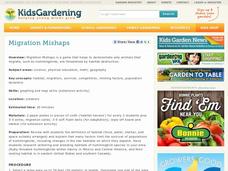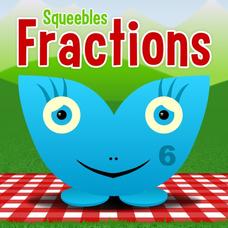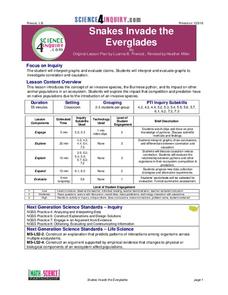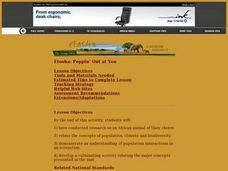Howard Hughes Medical Institute
Survival of the Fittest - Variations in the Clam Species Clamys sweetus
It's not often that you come across a clever laboratory activity that is both imaginative and comprehensive! Using M&M's and Reese's peanut butter candies to represent two different clam species, young biologists test for "relative...
National Gardening Association
Migration Mishaps
Elementary ecologists pretend to be migratory hummingbirds. They fly between wintering and nesting grounds, trying to reach a habitat haven. In a musical-chair fashion, some birds will miss out, and are removed from the game. To further...
McGraw Hill
Arthropods
Are spiders related to crabs? Study the order of arthropods with a reading selection about animal diversity. It provides details about each class within the order, as well as vivid pictures and explanatory charts.
Messenger Education
Give Me a Boost—How Gravity Assists Aid Space Exploration
The propellant needed for space explorations runs in the thousands, while paying to get the craft into orbit costs millions! In the second installment of three, two activities explore laws of conservation of energy and momentum. Using...
Smithsonian Institution
Science Starts With a Question: Energy - Teacher Guide
Get an up-close look at energy transfer. Using a three-part activity, investigators first observe a teacher-led demonstration before building a model marble track to convert potential energy to kinetic energy. Scientists explore six...
American Physiological Society
Sticky Adaptations A Lesson on Natural Selection
Now you see it, now you don't! The stick bug exhibits the ability to disappear into a wooded environment. Why does this adaptation manifest in some species, but not in others? Life science learners explore animal adaptations in nature...
Consortium for Ocean Science Exploration and Engagement (COSEE)
Arctic Smorgasbord
Though the walrus spends roughly one third of its time on land, it eats organisms that live on the bottom of the ocean. The first in a series of five, the lesson uses a variety of plant and animal cards to have scholars build an arctic...
Curated OER
Species Charades
Students identify endangered species. In this endangered species activity, the teacher leads a discussion about endangered species, then the class plays a game of charades to pantomime animal behavior.
Curated OER
Kids for Conservation: Animal Unit
Students discuss animal needs and characteristics. In this animal mini-unit, students complete three activities studying different animals, their needs, how they have evolved, and how to protect them.
Curated OER
Fraction Activities
In these various fraction activities activity, students participate in whole class, small group, and individual projects to understand fractions, make fractions, and use a fraction chart to find equivalent fractions. Students answer 26...
Curated OER
Animal Organs and the Study of Reproduction, Embryology and Cancer
Students examine organs from dogs and cats to study reproduction, embryology, and the identification of cancer. They record their observations at both the gross and microscopic levels. They present their information to the class.
Cornell University
Bridge Building
Bridge the gaps in your knowledge of bridges. Individuals learn about bridge types by building models. The activity introduces beam bridges, arch bridges, truss bridges, and suspension bridges.
Curated OER
Water is Life
Krill is a very small ocean animal that is key to keeping the ocean ecosystem going. The class reviews food webs and chains, learns about the importance of krill, discusses krill anatomy, builds a model of a krill, and then has a...
Howard Hughes Medical Institute
Scientific Inquiry Using WildCam Gorongosa
How do scientists determine what questions to ask to meet their research goals? Help your class develop an inquiry mindset with a lesson based on studies in the Gorongosa National Park. Partners create their own research questions by...
Curated OER
Annual Skinner Box Rat Training Competition
Students explore animal behvior. Using Skinner boxes, they monitor and train rats to accomplish a set of tasks. They maintain a log of observations, task completions and data.
Curated OER
Ecology: Factors Influencing Animal Populations
Young scholars assess the factors affecting animal populations. Working in groups they define specific vocabulary terms and complete several activities from "Project Wild."
Key Stage Fun
Squeebles Fractions
We are not exactly sure what a Squeeble is, but apparently they love cake and fractions, and your little bakers-turned-mathematicians will also. This app focuses on the basics of fractions including modeling fractions, equivalent...
FatChicken Studios
Charades! Kids
Review content, fill a few minutes of time, hold a competition between several teams of students, and more. It all starts with asking pupils to hold tablets or smartphones up to their foreheads! From there, your class will head straight...
Curated OER
Seven Habits of Highly Effective Teens Worksheet
Based on the bestselling series, this worksheet details seven habits of highly defective teens, and prompts young learners to consider their own social and emotional tendencies. What kinds of experiences do your pupils have...
American Museum of Natural History
What Do You Know About T. Rex?
There's so much to learn about dinosaurs. A 10-question quiz tests knowledge of the more detailed characteristics of the Tyrannosaurus Rex. As individuals complete the quiz, they better understand how fossil records helped define some of...
Curated OER
How Many Penguins Does It Take? Studying Carrying Capacity and Limiting Factors
How does a population's habitat determine the size of that population? Teach learners about carrying capacity and limiting factors with an engaging roleplay activity. Class members pose as a colony of penguins who must gather food amidst...
Curated OER
Sound Tracks Game
Students engage in a lesson that is concerned with the playing of soundtracke to learn the alphabet, animal sounds, and nursery rhymes. They are given the opportunity of working together or independently listen to the stories.
Science 4 Inquiry
Snakes in the Everglades
The Burmese python is on the loose ... and he's hungry! Illustrate the differences between causative and correlative relationships through an inquiry lesson. Pupils examine several sources of information to determine if there is a...
Curated OER
Etosha: Poppin' Out at You
Tenth graders research an African animal of their choice and relate the concepts of population, climate and biodiversity to their animal. They examine how population interacts in an ecosystem.

























